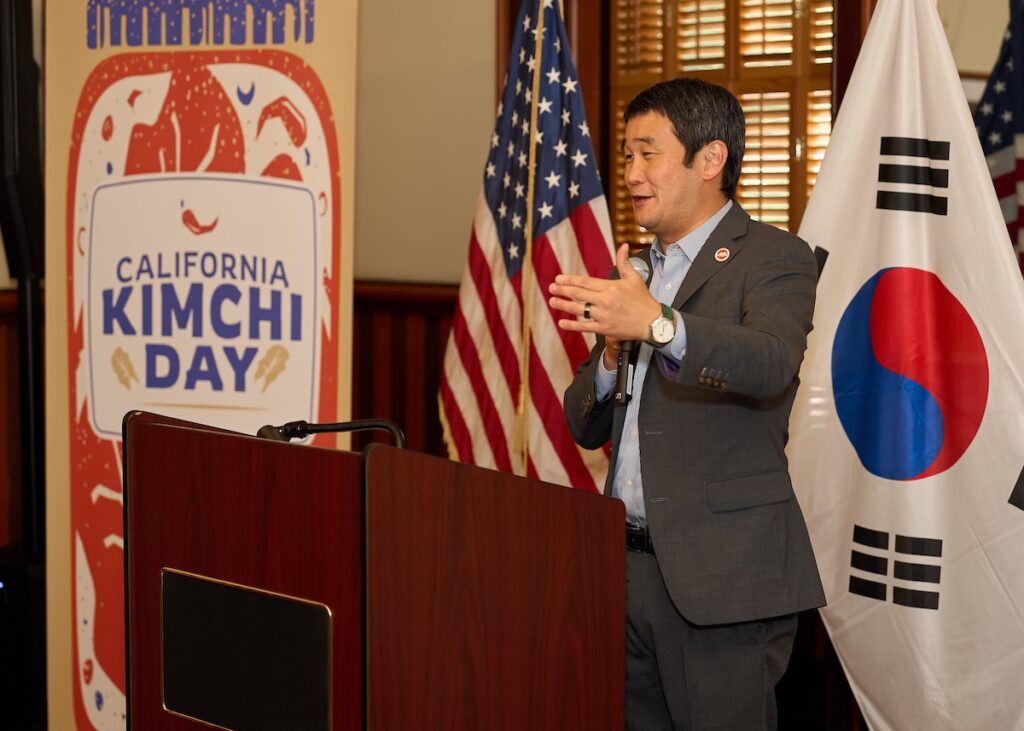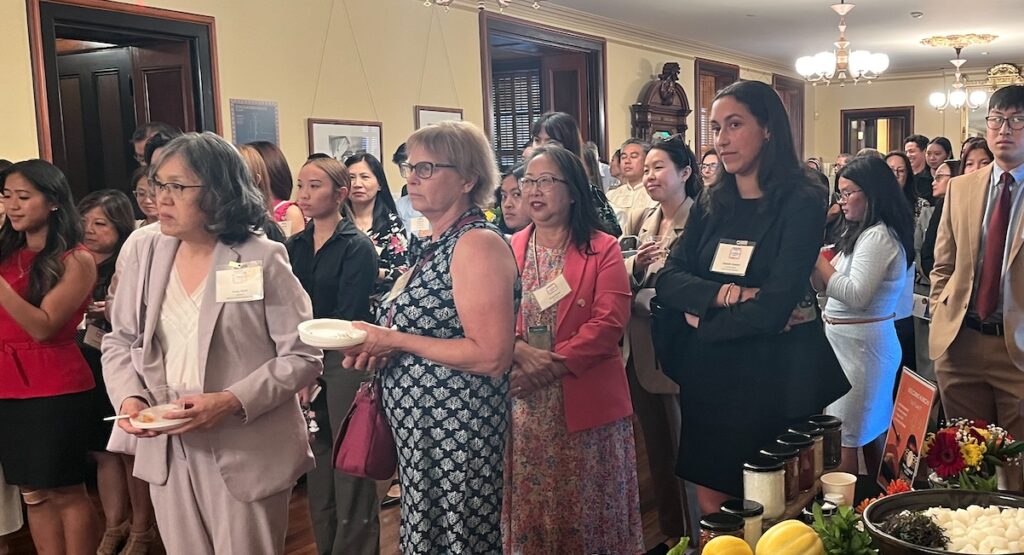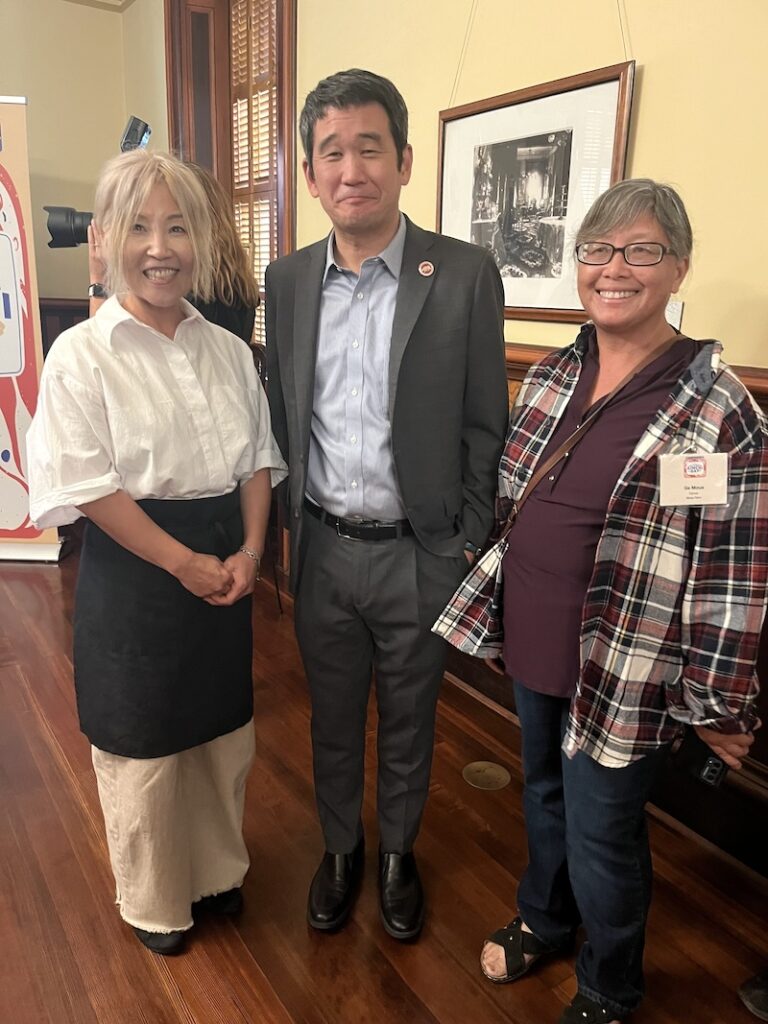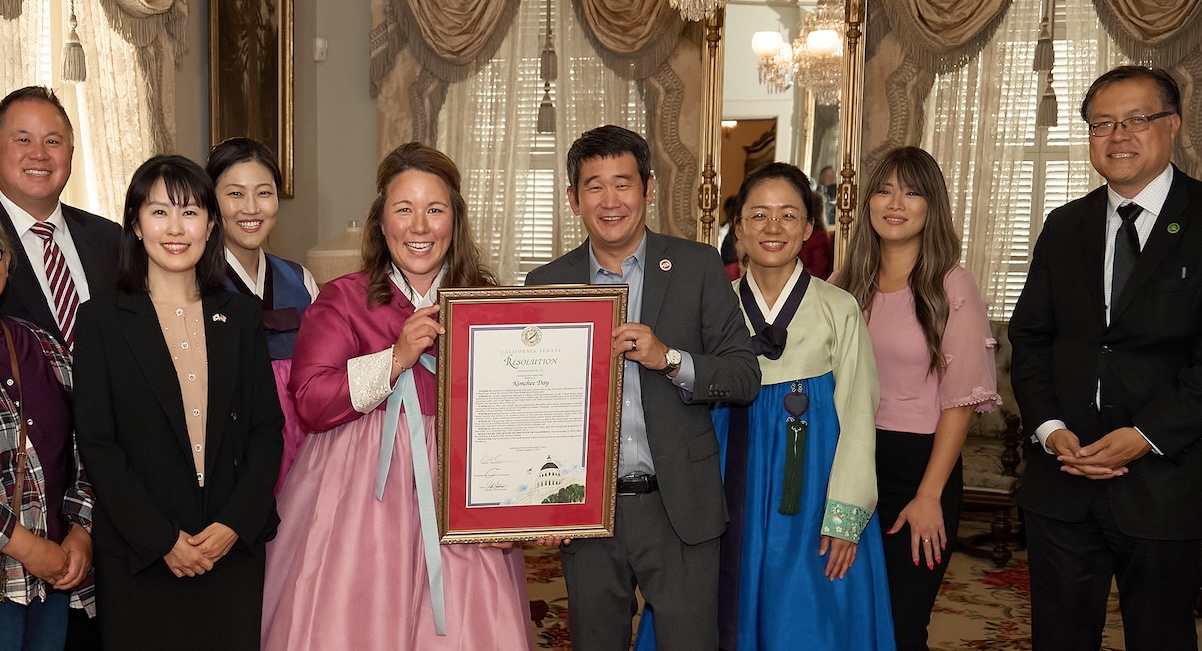California Sen. Dave Min (D – Orange County) says his kids believe being Korean American is “the coolest” thing ever. It’s a radical departure from Min’s own childhood in the Bay Area, where he admits he was “ashamed” of his Korean heritage.
And if there was one thing that typified that sense of shame, says Min, it was kimchi (or kimchee as it is sometimes spelled), the traditional Korean staple often made from fermented cabbage, garlic and spices.
“Growing up as a Korean kid in California, there were no other Koreans in my class,” Min said, speaking Monday on the Senate floor. “And back then, being Korean was decidedly not cool.”
As for kimchi, “It was the embodiment of everything I was led to feel ashamed of about my own culture. It was a stinky food… that everyone made fun of. Gross, yuck, those were the terms I heard.” (You can watch a recording of Min’s remarks here. Scroll ahead to the 24 min. mark.)

What a difference a generation makes.
Min’s remarks were delivered during a hearing on Senate Resolution 102, declaring Nov. 22 California Kimchi Day. On Wednesday, Min joined a diverse gathering of over 100 people – including fellow APIA lawmakers Mike Fong and Phil Ting – in Sacramento to celebrate the resolution’s passage.
“Korean Americans represent a vibrant, growing community,” the resolution reads in part, “and an indispensable part of the fabric of the United States.”
Resolutions are non-binding statements that typically express the body’s position on related issues. The date, Nov. 22 coincides with a similar initiative passed in South Korea in 2020 aiming to highlight kimchi’s growing global popularity.
Min, whose district includes Irvine, home to a large Korean community, is the only Korean American in the State Legislature. He terms out in Dec. and plans to run for a seat in the US House.
California is home to the nation’s largest Korean population, at more than 500,000, with a majority concentrated in Los Angeles and the greater Southern California region. The figure represents nearly a third of the 1.7 million Koreans living in the US.
Bi-lateral trade between California and South Korea topped $40 billion in 2022, punctuating the 70-year-old alliance between the Republic of Korea (South Korea’s formal name) and the United States, an alliance dating back to the first stirrings of the Korean War in 1950.
Still, despite America’s long social, political and military involvement with Korea, knowledge of the country’s history, culture and food among ordinary Americans remained limited, with the “Hermit Kingdom” – as Korea was once pejoratively known – being overshadowed in the popular imagination by its neighbors, Japan and China.

Wednesday’s event is a sign of how far the Korean American community in California has come.
“I’ve been a part of the Sacramento and statewide API community for a long time,” says Sonya Harris, who heads the consulting firm Sage Strategies and organized Wednesday’s event. “And looking around, I saw so many events celebrating other API traditions, but there was nothing that related specifically to the Korean community.”
Harris, who is half Korean on her mother’s side, recalls once trying to find Korean culture and language classes. “I wanted to learn more about my heritage,” she says, “but there was nothing available.”
Today, thanks in part to the rise of the Korean Wave – that meteoric surge in popularity for all things Korean – Korea has landed squarely on the global pop-culture map, drawing fans and devotees from across the globe.

More recently, rising interest in and understanding of the health benefits of fermented foods like kimchi have helped to transform what was once a mark of shame for Korean Americans like Min into a rapidly growing industry, with some estimates putting global kimchi exports at $5.3 billion by the end of the decade.
Here in the US, sales of a dish that once sent many American eaters running in the other direction, have topped $30 million with forecasts of continued growth over the coming years. Kimchi is now available on shelves in major supermarket chains nationwide.
On a blazing Wednesday afternoon in Sacramento, people filled booths at Blue House, a popular Korean restaurant, busily grilling an array of meats amid a variety of small dishes filled with pickled and fermented veggies. Owner Paul Choi, who also heads the Sacramento Valley Korean American Community association, says his mission is to “bring happiness” to his customers.
Blue House (also the name of Korea’s presidential residence in Seoul) helped sponsor Wednesday’s event. On Friday, Choi will celebrate the opening of a third location in nearby Vacaville.
“To have a Korean immigrant want to create happiness for people and employing more than 200 people to do that. This embodies the California dream,” says Harris, adding that events like Kimchi Day can play an important role in helping to strengthen the social fabric that connects California’s diverse population.
“When we take the time to learn about each other’s cultures…” she says, “if we can just sit down and eat together, we can be more empathetic. We understand our paths are more similar than we realize.”
This resource is supported in whole or in part by funding provided by the State of California, administered by the California State Library in partnership with the California Department of Social Services and the California Commission on Asian and Pacific Islander American Affairs as part of the Stop the Hate program. To report a hate incident or hate crime and get support, go to CA vs Hate.





